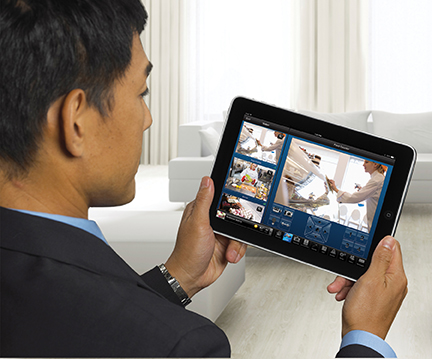
Home alarm systems come in a variety of sizes and levels of complexity, and given that at times complexity, many people ask; “Can I self monitor my home security alarm system”?
What exactly does it mean to have an alarm system monitored by a security company or base monitoring of a security system? Typically when a security system is installed it will have a host of methods of alerting if any part of the alarm is tripped.
Alarm monitoring is probably the most important aspect of a home security system.
In the old days, this consisted of an audible alarm and flashing strobe light. While this is still appropriate as a deterrent to alert an intruder to the fact that the alarm has been tripped, they can be easily ignored or not even noticed, and so police, security staff or owners might never be contacted until it is too late.
A more modern home security system will send an email, text message or other alerts to a mobile phone or another device to let a nominated person or persons know that an alarm has been triggered.
In a fully monitored situation, this alert will come through to a trained security guard sitting in a secure control room. From here the guard can investigate further, perhaps gathering other information from sensors in the property, or else bringing up a live feed form on-site security cameras.
A base security monitor may also be triggered by a panic button – something that a resident might press if they are at home and feel threatened.
What will a Security Alarm Monitoring Company do?
From this, the monitoring centre security guard can determine a course of action. Based on the type of alarms triggered and so on, he can opt to;
1) contact an owner or another nominated person to attend the property and disable any alarms or take further action
2) have a security patrol person attend the property and make a physical inspection of the site to determine if the alarm is genuine and further action is needed
3) contact police or other emergency services to be on site – this would be appropriate if intruders are still on site or property has been left unsafe in some way, or if there was an obvious injury to a person or a known theft had occurred.
Written policies will determine the exact course of action.
This would clearly be the highest level of security possible for a home. However, some people may find this overkill, or potentially too expensive, and so may opt to self-monitor.
How to Self Monitor
To do this you will need to;
1) install motion and heat sensors, as well as door and window read sensors to detect a possible break-in has occurred.
2) have these sensors connect to a central device (or independently message) so that a message of some immediate kind can be sent to an owner or nominated person.
3) install cameras throughout the property, both inside and outside that can be remotely monitored. Cameras should have infrared lights so that they can be used in the dark as well as day time.
On the event of receiving an alert (usually to your phone), check what sensors have been tripped. If you have multiple sensors in the house you would expect several to alert in the event of a genuine break in.
Then you should check the cameras for any movement. If you see an intruder in the house or someone that you do not expect to see, contact police immediately and without delay.
If there is no one currently in the house, but you suspect there has recently been, make your way to the property to secure it and contact police, or have a trusted person nearby do that for you.
If you determine that the alarm was a false alarm, check and test equipment so that the error is eliminated or accounted for.
It is very important for peace of mind that the security equipment installed is properly tested on installation and routinely thereafter to ensure it works as expected. You do not want to be woken up constantly at 3 am while on holidays because of false alarms. Similarly, you don’t want to come home from work to find a break in has occurred and the alarm did not trigger.
It is for this reason that the security industry always recommends that even if you have a self-monitored home alarm system, you should always have the alarm system installed by a qualified technician and use the best equipment you can afford.
Let me know if you have any questions about how to go about installing or monitoring a home alarm system for the best security solution.
If you liked this article then you might also like Home Alarm Systems
Find us on Facebook
